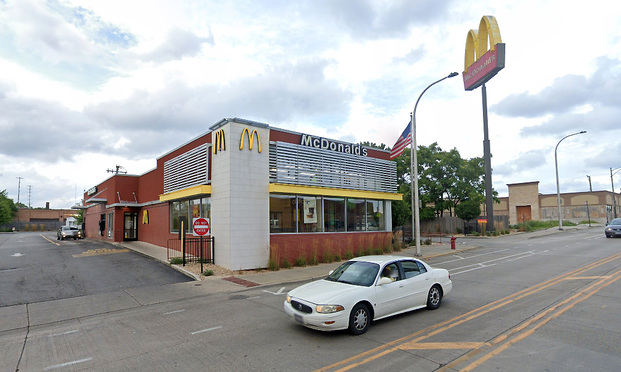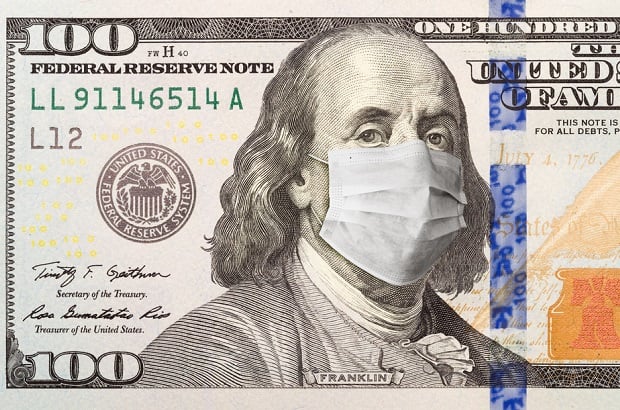 McDonald's restaurant located at2438 W. Cermak Rd., Chicago, Illinois.
McDonald's restaurant located at2438 W. Cermak Rd., Chicago, Illinois.In one of the first rulings to order a business toimprove its Covid-19 pandemic protections, a Chicago judgehas ordered McDonald's to better enforce social distancing and maskwearing at its stores, concluding the risks to the community are"severe" and potentially a "matter of life or death" for itsemployees.
|Wednesday's ruling by Cook County Circuit CourtJudge Eve Reilly found that McDonald's had supplied enough facecoverings, hand sanitizer, and gloves; monitored infections amongworkers; and educated employees on how the Covid-19 pandemicspreads. However, she wrote, McDonald's was not properly trainingits employees on two key elements of its policies: socialdistancing and correct wearing of masks. And that contradictedIllinois Governor J.B. Pritzker's executive order on May 29regarding Covid-19 protections.
|While McDonald's "has the right idea," the judge wrote in herorder, which partly granted an emergency motion for preliminaryinjunction, "it is not being put into practice exactly asMcDonald's envisioned, thus endangering public health.
|"The potential risk of harm to these plaintiffs and thecommunity at large is severe," she wrote. "It may very well be amatter of life or death to individuals who come in contact withthese restaurants or employees of these restaurants on a regular,or even semi-regular basis, during the Covid-19 pandemic. And whilethere are many individuals who believe the pandemic is no longer athreat, science and medical research indicate otherwise. There is along road to recovery for all of us."
|The ruling comes after four days of testimony that included BillGarrett, the senior vice president of operations at McDonald's, andtwo days after another judge in California granted a temporaryrestraining order against a McDonald's franchise in a case in whichemployees at a store were told to wear coffee filters and doggiediapers as masks.
|"The preliminary injunction shows that McDonald's restaurantsfailed to keep their workers safe amid the Covid-19 pandemic andposed a danger to public health, particularlywhen it came to social distancing and masks," Danny Rosenthal ofJames & Hoffman in Washington, D.C., an attorney for theplaintiffs, wrote in an emailed statement.
|"We are pleased that Judge Reilly issued an injunction that willnot only help keep workers safe, but will also protect workers'families, McDonald's customers, and the community at large,"Rosenthal said.
|McDonald's said in an emailed statement that the judge found itsCovid-19 policies did many things right: "McDonald's is pleased thejudge found that strong measures are already in place across theseChicagoland restaurants to create a safe experience for customersand crew, including providing sufficient supply of masks, gloves,and sanitizers and sufficiently monitoring for Covid cases, asMcDonald's is doing throughout the country. These measures are partof the 50 processes we have enhanced during the pandemicto keep restaurant employees and customers safe. We have alsoissued a 59-page guide outlining national minimum restaurantstandards, including adhering to social distancing guidelines forcustomers and crew; conducting wellness and temperature checks;requiring protective barriers, face masks, and gloves; increasingthe frequency of hand washing; and providing contactless purchasingoptions to customers."
|The case, filed on May 19, involved five employees at fourMcDonald's locations in Chicago, and four people who lived withthem, alleging the restaurant chain had failed to provide enoughprotections from the coronavirus. The case is one of the few to aska judge to order a business to impose Covid-19 protections, themost prominent of which involved a public nuisance case againstmeat processor Smithfield Foods Inc. that ended in an order denyingthe plaintiffs' injunction request.
|McDonald's also faces another class action, brought on June 16,alleging the restaurant chain created a public nuisance at a storein Oakland, California, by allowing 23 people to getsick with Covid-19, includinga 10-month-old baby.
|The class action in Chicago alleges both public nuisance andnegligence claims against McDonald's and two franchise owners, oneof which dropped out of the case after selling its store. Two ofthe stores had Covid-19 cases among their employees, according tothe judge's order.
|McDonald's lost an attempt to dismiss the case on jurisdictional grounds,setting the stage for a showdown over a potential preliminaryinjunction.
|In addition to Garrett, the preliminary injunction hearing, heldvia Zoom and broadcast live on YouTube, featured lengthy testimonyfrom the plaintiffs, store managers, and experts on both sides, aswell as numerous slides of store signs, layouts, andphotographs.
|In her ruling, Reilly found that McDonald's had provided much ofwhat the plaintiffs initially had asked for, such as hand sanitizerand masks. She also found that its policies, such as posting signsrequiring customers to wear masks and installing Plexiglas at thecounter and drive-thru, were "not unreasonable."
|But, she noted, McDonald's also told employees they could becloser than six feet if they passed each other momentarily, as longas it's not for 10 minutes or more.
|"McDonald's has created an environment that leads employees,including managers, to believe they can take off their masks andstand within 6 feet of each other as long as they do not do so inexcess of 10 minutes," Reilly wrote. "This increases the healthrisk for the employees, their families, and the public as a wholeand conflicts with the governor's order on social distancing,potentially undoing any good it has done as we fight thisincredibly contagious disease."
|She also cited photographic evidence and the testimony ofemployees that workers stood within six feet of each other withoutproperly wearing masks—both of which were "serious failures."Social distancing and masks, she wrote, were key elements of thegovernor's order, as well has health guidelines from the IllinoisDepartment of Public Health and the U.S. Centers for DiseaseControl and Prevention.
|"Although neither in and of themselves necessarily create asubstantial or unreasonable interference with the public's or theplaintiffs' rights, the combination certainly does," she wrote.
|She denied an injunction as to the plaintiffs' negligenceclaims, calling their alleged injuries "speculative" given thatnone of the plaintiffs had evidence of Covid-19 exposure orinfection.
||
From: CorporateCounsel
Complete your profile to continue reading and get FREE access to Treasury & Risk, part of your ALM digital membership.
Your access to unlimited Treasury & Risk content isn’t changing.
Once you are an ALM digital member, you’ll receive:
- Critical Treasury & Risk information including in-depth analysis of treasury and finance best practices, case studies with corporate innovators, informative newsletters, educational webcasts and videos, and resources from industry leaders.
- Exclusive discounts on ALM and Treasury & Risk events.
- Access to other award-winning ALM websites including PropertyCasualty360.com and Law.com.
*May exclude premium content
Already have an account? Sign In
© 2024 ALM Global, LLC, All Rights Reserved. Request academic re-use from www.copyright.com. All other uses, submit a request to [email protected]. For more information visit Asset & Logo Licensing.








